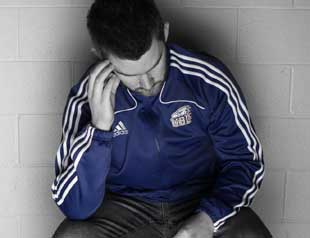Pressures That Cause Athletes to Seek Mental Health Treatment
The life of an athlete is not necessarily as fun and easy as many fans believe it to be. Not only do professional sports take a physical toll on an athlete’s body, but a mental toll as well. Many people do not understand the enormous amount of stress that goes along with being a truly great athlete. On the field, these athletes may make their profession seem easy, which can lead people to develop the perception that athletes do not have the same problems that everyone else has. However, being an athlete means that there are going to be a lot of demands placed upon you.  Not only is there constant pressure to play exceptionally well, but there is the excessive traveling and long periods of time spent away from loved ones.
Not only is there constant pressure to play exceptionally well, but there is the excessive traveling and long periods of time spent away from loved ones.
While many athletes live for their time in the spotlight, the expectation to outperform the competition only exacerbates their levels of stress. Not only are coaches, parents, and fans relying on them, but the athletes may hold themselves to extremely high standards. When games are not won or mistakes are made an athlete can develop a negative sense of self-worth, as they believe they have let down those individuals who are counting on them.
Treatment Program: Lauren Hardy M.A., writes on behalf of Athletes Recovery which is a residential program specifically for collegiate and professional athletes, both active and retired, struggling with mental health and substance abuse issues.
The Effects of Stress on an Athlete's Mental Health
 The pressure to perform at high levels, constant attention from fans, the amount of money at stake, and a number of other daily demands can take a mental and emotional toll on an athlete. If pushed too hard for too long an athlete can begin to experience a number of negative consequences, such as losing their competitive edge and developing feelings of self-doubt, which directly affects an athlete’s ability to cope with the regular stress of a competitive environment. Ultimately, this can lead to a drop in overall performance. With continued exposure to stress, it can lead to burnout; which only increases feelings of dissatisfaction and results in the decision to leave the sport completely.
The pressure to perform at high levels, constant attention from fans, the amount of money at stake, and a number of other daily demands can take a mental and emotional toll on an athlete. If pushed too hard for too long an athlete can begin to experience a number of negative consequences, such as losing their competitive edge and developing feelings of self-doubt, which directly affects an athlete’s ability to cope with the regular stress of a competitive environment. Ultimately, this can lead to a drop in overall performance. With continued exposure to stress, it can lead to burnout; which only increases feelings of dissatisfaction and results in the decision to leave the sport completely.
As the pressure on athletes increases, it is becoming more common for the development of stress-related illnesses. Many athletes have developed depression due to setbacks that may have challenged their self-esteem and self-worth (Depression Treatment: Outpatient vs. Inpatient). Additionally, many athletes struggle with large amounts of anxiety surrounding their performance, which may be due to the fear of failure. In an attempt to cope with stress-related symptoms, many athletes turn to substances such as drugs or alcohol for comfort. Athletes who are not getting the mental health treatment they need may self-medicate in order to numb their emotions and temporarily escape all of the stress in their lives. While this may temporarily reduce symptoms, in the long run it will only make matters worse.
Mental Health, Addiction Treatment for Athletes
For athletes who are struggling to manage stress as a result of the high demands placed upon them on a daily basis, mental health or addiction treatment can help them overcome the pressure so that they can once again get back to their highest level of functioning. Residential programs that understand the specific emotional and physical challenges experienced by athletes have been known to be extremely effective. A residential treatment program can simultaneously address any mental health issues and substance abuse that today’s athletes are facing.
You can also find Lauren Hardy on Google+.
(ED. Note: All images are for illustrative purposes only and not meant to imply or infer that any athletes pictured have a mental health or addiction issue.)
APA Reference
Hardy, L.
(2014, May 1). Pressures That Cause Athletes to Seek Mental Health Treatment, HealthyPlace. Retrieved
on 2025, December 5 from https://www.healthyplace.com/blogs/mentalhealthtreatmentcircle/2014/05/pressures-that-cause-athletes-to-seek-mental-health-treatment